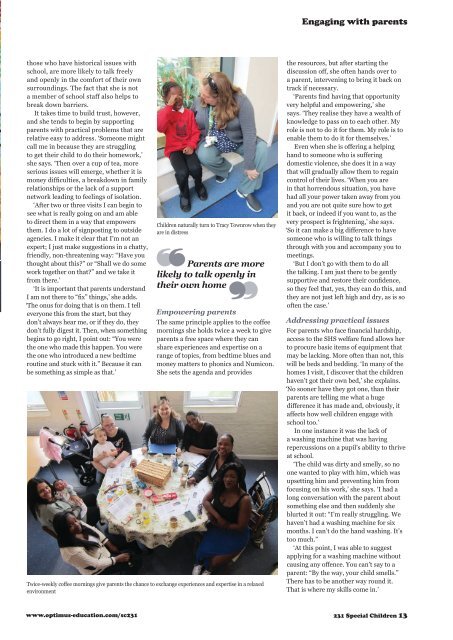champions
1H1C301qFr9
1H1C301qFr9
You also want an ePaper? Increase the reach of your titles
YUMPU automatically turns print PDFs into web optimized ePapers that Google loves.
Engaging with parents<br />
those who have historical issues with<br />
school, are more likely to talk freely<br />
and openly in the comfort of their own<br />
surroundings. The fact that she is not<br />
a member of school staff also helps to<br />
break down barriers.<br />
It takes time to build trust, however,<br />
and she tends to begin by supporting<br />
parents with practical problems that are<br />
relative easy to address. ‘Someone might<br />
call me in because they are struggling<br />
to get their child to do their homework,’<br />
she says. ‘Then over a cup of tea, more<br />
serious issues will emerge, whether it is<br />
money difficulties, a breakdown in family<br />
relationships or the lack of a support<br />
network leading to feelings of isolation.<br />
‘After two or three visits I can begin to<br />
see what is really going on and am able<br />
to direct them in a way that empowers<br />
them. I do a lot of signposting to outside<br />
agencies. I make it clear that I’m not an<br />
expert; I just make suggestions in a chatty,<br />
friendly, non-threatening way: “Have you<br />
thought about this?” or “Shall we do some<br />
work together on that?” and we take it<br />
from there.’<br />
‘It is important that parents understand<br />
I am not there to “fix” things,’ she adds.<br />
‘The onus for doing that is on them. I tell<br />
everyone this from the start, but they<br />
don’t always hear me, or if they do, they<br />
don’t fully digest it. Then, when something<br />
begins to go right, I point out: “You were<br />
the one who made this happen. You were<br />
the one who introduced a new bedtime<br />
routine and stuck with it.” Because it can<br />
be something as simple as that.’<br />
Children naturally turn to Tracy Townrow when they<br />
are in distress<br />
Parents are more<br />
likely to talk openly in<br />
their own home<br />
Empowering parents<br />
The same principle applies to the coffee<br />
mornings she holds twice a week to give<br />
parents a free space where they can<br />
share experiences and expertise on a<br />
range of topics, from bedtime blues and<br />
money matters to phonics and Numicon.<br />
She sets the agenda and provides<br />
Twice-weekly coffee mornings give parents the chance to exchange experiences and expertise in a relaxed<br />
environment<br />
the resources, but after starting the<br />
discussion off, she often hands over to<br />
a parent, intervening to bring it back on<br />
track if necessary.<br />
‘Parents find having that opportunity<br />
very helpful and empowering,’ she<br />
says. ‘They realise they have a wealth of<br />
knowledge to pass on to each other. My<br />
role is not to do it for them. My role is to<br />
enable them to do it for themselves.’<br />
Even when she is offering a helping<br />
hand to someone who is suffering<br />
domestic violence, she does it in a way<br />
that will gradually allow them to regain<br />
control of their lives. ‘When you are<br />
in that horrendous situation, you have<br />
had all your power taken away from you<br />
and you are not quite sure how to get<br />
it back, or indeed if you want to, as the<br />
very prospect is frightening,’ she says.<br />
‘So it can make a big difference to have<br />
someone who is willing to talk things<br />
through with you and accompany you to<br />
meetings.<br />
‘But I don’t go with them to do all<br />
the talking. I am just there to be gently<br />
supportive and restore their confidence,<br />
so they feel that, yes, they can do this, and<br />
they are not just left high and dry, as is so<br />
often the case.’<br />
Addressing practical issues<br />
For parents who face financial hardship,<br />
access to the SHS welfare fund allows her<br />
to procure basic items of equipment that<br />
may be lacking. More often than not, this<br />
will be beds and bedding. ‘In many of the<br />
homes I visit, I discover that the children<br />
haven’t got their own bed,’ she explains.<br />
‘No sooner have they got one, than their<br />
parents are telling me what a huge<br />
difference it has made and, obviously, it<br />
affects how well children engage with<br />
school too.’<br />
In one instance it was the lack of<br />
a washing machine that was having<br />
repercussions on a pupil’s ability to thrive<br />
at school.<br />
‘The child was dirty and smelly, so no<br />
one wanted to play with him, which was<br />
upsetting him and preventing him from<br />
focusing on his work,’ she says. ‘I had a<br />
long conversation with the parent about<br />
something else and then suddenly she<br />
blurted it out: “I’m really struggling. We<br />
haven’t had a washing machine for six<br />
months. I can’t do the hand washing. It’s<br />
too much.”<br />
‘At this point, I was able to suggest<br />
applying for a washing machine without<br />
causing any offence. You can’t say to a<br />
parent: “By the way, your child smells.”<br />
There has to be another way round it.<br />
That is where my skills come in.’<br />
www.optimus-education.com/sc231<br />
231 Special Children 13


